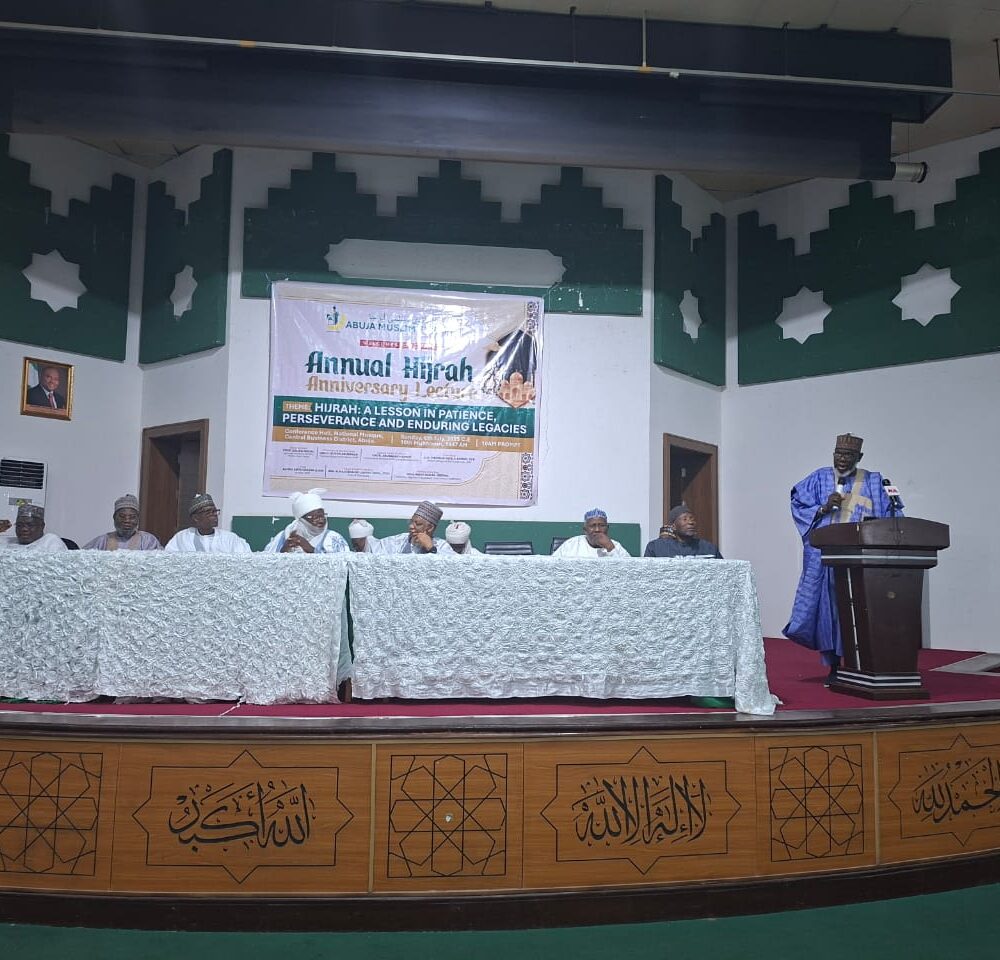In the Name of Allah, the Most Gracious, the Most Merciful
All praise is due to Allah, the Lord of all creation, may Allah extol the mention of our noble Prophet Muhammad in the highest company of Angels, bless him and give him peace and security―and his family, his Companions and all those who follow him correctly and sincerely until the establishment of the Hour.
Dear brothers and sisters! The original sources of Islam, the Noble Qur’an and Sunnah, employ a variety of terminology and narration to elucidate and condemn a broad category of behavioural digressions involving corruption, including bribery, nepotism and rule substitution. Corruption is seen to stem from the abuse of administrative power of any kind, judicial power, political authority and financial dominance. Further, all corrupt acts are construed as lacking in virtue from a moral perspective and unjust in relation to the principles that safeguard rendering to everyone their due, thereby undermining communal harmony.
This position matches well with the shift in social scientific thought from viewing corruption as ‘grease that oils the economic wheels’ to a ‘menace that undermines economic growth.’ Where the two differ is with respect to remedial action. The Western approach focuses on designing systems and institutions that seek to root out corruption while minimising opportunities and enticement for corruption. In short, it emphasises constraints external to the individual.
By comparison, Islam seeks to go beyond such constraints, and also instil in believers a clear ‘second-order’ preference for non-corrupt behaviour. It recommends developing a firm belief in transcendent accountability and stresses character building through practising moral virtues and shunning vices. In essence, in circumstances where the chances of detection are low, the restraint comes from within. It is our contention that both emphases are important in eliminating corruption.
Respected brothers and sisters! Corruption in the view of Islam is defined as the term ‘Akhzul Amwal Bil Batil’, which means consuming other people’s property in a vanity way. This term refers to surah al-Baqarah verse 188 and surah al-Maidah verse 42.
Correspondingly, corruption is associated with Ghulul, which means stealing people’s property or public property.
Corruption has been considered a crime for the survival of the bureaucracy. At the same time, corruption has become the most destructive social disease in the system of social values in Islam.
As described in Surah al-Fajr verses 15-20 as social upheaval, corruption itself is not only a matter of money but also moral matters that have been damaged and the loss of self-confidence.
In terms of Islamic law, corruption cases fall into the area of mu’amalah Maliyah [socio-economic] or fiqh siyasah [constitutional law] based on the problem of Maliyah [objects].
Some existing writings on Islam and corruption discuss moral education in Islam used to prevent corruption. However, Muslim-majority countries viewed from a Western perspective are seen most often as ‘highly corrupt’ by the Transparency International Corruption Perceptions Indexes.
In Islam, corruption is highly condemned and corruption is pervasive, which opposes corrupt practices.
Corruption that is widely practised in this Muslim-majority country has significantly impacted Islamic banking. This disease of corruption has prevented Islamic banking from becoming a more effective and meaningful pathway for poverty alleviation and economic development. And a solid legal system can increase perceptions of control over corruption cases.
Dear brothers and sisters! In January 2023, the global anti-corruption watchdog Transparency International released its annual corruption perception index, which ranks the perceived level of public sector corruption across 180 countries worldwide. That year’s report painted a grim picture that revealed that many countries have failed to make any progress in the fight against corruption since 2017.
The report reveals a clear connection between Insecurity and corruption, something that is rarely interrogated. The Nigerian experience confirms that governments plagued by corruption lack the capacity to protect their people from criminality and insurrection. Despite the government spending billions of dollars to fight insecurity at both the national and sub-national levels, security continues to worsen. Cases of banditry, kidnapping and terrorism have become frequent across the whole country.
Sometimes the security agencies have not been able to adequately respond leaving some parts of the country under the control of terrorists and bandits who collect ‘tax’ from local farmers. There are even instances where the kidnap victims spoke of collaboration between the state security agencies and the kidnappers after their release.
In 2022 alone, media reports estimate about 4,545 people were killed while another 4,611 were kidnapped by non-state actors. Gunmen have attacked several government buildings mosques and churches across the country, leaving many people dead.
Terrorists, bandits and criminal organisations across the country have been emboldened while citizens live in constant fear and corrupt officials thrive in impunity.
The Government Defense Integrity Index published in 2020 revealed that Nigeria faces a high risk across its defence institutions with minimal controls in operations. The country ranks 143 out of 163 on the Global Peace Index in 2022, alongside nations like Iran, Cameroon and Colombia.
Fellow Nigerians! Have you ever wondered why some nations seem to be stuck in a cycle of poverty, insecurity, hunger and underdevelopment? The answer is often corruption. Corruption is a disease that eats away at the very fabric of a society, destroying trust, undermining institutions, and eroding the rule of law. In this sermon, In Shaa Allah I will explore how corruption destroys nations by examining its impact on economic growth, social cohesion, and political stability. I will also discuss why it is so difficult to root out corruption and what can be done to combat it. So buckle up and get ready to dive into the dark world of corruption and its devastating consequences.
Corruption is a malignant cancer that eats away at the very fabric of a nation, and one of the most devastating effects of corruption is its impact on economic growth. When corruption is rampant in a society, it creates an environment of uncertainty and instability that discourages investment and stifles economic growth because it undermines the rule of law, erodes public trust in government institutions, and creates a culture of impunity where those in power can act with impunity.
Moreover, corruption diverts resources away from productive activities and into the pockets of corrupt officials and their cronies. Corruption leads to a misallocation of resources and a distortion of the economy, as resources are directed towards activities that generate rents rather than those that create value. As a result, corruption leads to a decrease in productivity, a decline in competitiveness, and a loss of confidence in the economy. Ultimately, the consequence of corruption leads to a decline in economic growth, which can have devastating consequences for a nation’s development and prosperity.
Corruption is a cancer that eats away at the fabric of society, and its impact on social cohesion cannot be overstated. When corruption is rampant, it undermines the trust that people have in their government and institutions. This lack of trust can lead to a breakdown in social cohesion, as people become more divided and less willing to work together for the common good of their nation.
In addition, corruption often leads to unequal distribution of resources, as those with power and influence can use their positions to enrich themselves at the expense of others, thereby creating a sense of resentment and injustice among those left behind, further eroding social cohesion. Ultimately, corruption destroys the sense of community and shared purpose that is necessary for a nation to thrive, and it is up to all of us to work together to root it out and build a more just and equitable society.
Corruption has a detrimental impact on political stability. When corruption is rampant within a government, citizens lose faith in their leaders and the political system as a whole, thereby leading to protests, civil unrest, and even violent uprisings. In addition, corrupt officials often use their power and influence to suppress opposition and dissent, further eroding political stability.
Furthermore, corruption can also lead to a lack of accountability and transparency within the government. When officials are more concerned with personal gain than serving the public, they are less likely to prioritise the needs and concerns of their constituents. This lack of accountability can lead to policies that benefit the corrupt few at the expense of the many, further eroding political stability and undermining the democratic process. Ultimately, corruption undermines the legitimacy of the government and can lead to a breakdown in the rule of law, posing a serious threat to the stability and prosperity of a nation.
Corruption is a complex and multifaceted problem that is difficult to root out. One of the primary reasons is that it often involves powerful individuals or groups who have a vested interest in maintaining the status quo. These individuals may use their wealth, influence, and political connections to protect themselves and their interests, making it difficult for law enforcement agencies and other authorities to hold them accountable.
Another reason why corruption is so difficult to combat is that it often involves a culture of impunity and a lack of transparency. In many cases, corrupt individuals are able to operate with impunity because there is no effective mechanism for holding them accountable. It can be due to weak or ineffective laws, a lack of political will, or a lack of resources and capacity within law enforcement agencies.
One solution to combating corruption is to increase transparency and accountability in government and business practices. This solution can be achieved through measures such as implementing anti-corruption laws, establishing independent oversight bodies, and promoting a culture of ethical behaviour. It is also important to educate citizens about the negative effects of corruption and encourage them to demand transparency and accountability from their leaders. Ultimately, rooting out corruption requires a collective effort from all members of society, including government officials, business leaders, religious leaders and citizens alike.
All praise is due to Allah, Lord of the worlds. May the peace, blessings and salutations of Allah be upon our noble Messenger, Muhammad, and upon his family, his Companions and his true followers.
Murtadha Muhammad Gusau is the Chief Imam of: Nagazi-Uvete Jumu’ah Mosque; and Late Alhaji Abdur-Rahman Okene Mosque, Okene, Kogi State, Nigeria. He can be reached via: [email protected]; or +2348038289761.
This Friday sermon (Jumu’ah Khutbah) was prepared for delivery today Friday, 24 Shawwal, 1445 AH (May 03, 2024).





